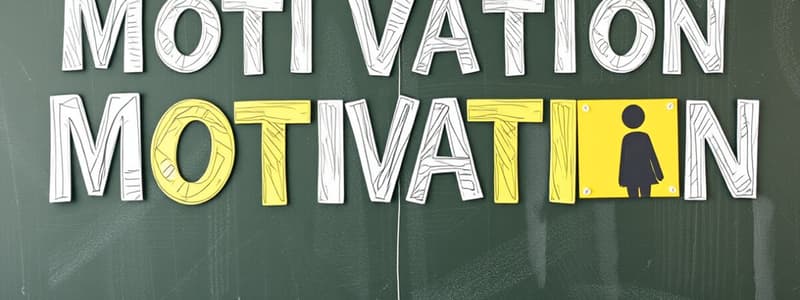Podcast
Questions and Answers
What is motivation?
What is motivation?
A condition that initiates, activates, or maintains an organism's goal-directed behaviour
Which of the following refers to intrinsic motivation?
Which of the following refers to intrinsic motivation?
- Volunteering for a resume
- Staying longer at work for recognition
- Earning money
- Feeling satisfaction from accomplishments (correct)
Which theory defines motivation as the balance of physiological needs?
Which theory defines motivation as the balance of physiological needs?
- Maslow’s hierarchy of needs
- Homeostatic drive theory (correct)
- Herzberg’s two-factor theory
- Skinner's behaviour modification theory
What type of motivation might be affected by individual personality, attitudes, and beliefs?
What type of motivation might be affected by individual personality, attitudes, and beliefs?
Motivation can lead to ________ behavior.
Motivation can lead to ________ behavior.
Extrinsic motivation involves behaviors that are rewarding in themselves.
Extrinsic motivation involves behaviors that are rewarding in themselves.
Name the theory that classifies needs into five levels, ranging from physiological to self-actualization.
Name the theory that classifies needs into five levels, ranging from physiological to self-actualization.
Which of the following best describes extrinsic motivation?
Which of the following best describes extrinsic motivation?
What is one of the unique attributes that each employee brings to the workplace?
What is one of the unique attributes that each employee brings to the workplace?
Herzberg's two-factor theory focuses on which two types of factors?
Herzberg's two-factor theory focuses on which two types of factors?
Flashcards are hidden until you start studying
Study Notes
Introduction to Motivation
- Motivation explains human behavior through goal-directed actions.
- Defined as a condition that initiates, activates, or maintains behavior towards achieving goals.
- Emotions significantly influence motivation by driving behavioral patterns.
Nature of Motivation
- Motivation is an internal condition, inferred from external behavior.
- In organizational settings, motivation affects work performance at individual and group levels.
- Management's goal is to attract and retain competent employees who align with organizational culture and values.
Types of Motivation
- Intrinsic Motivation: Engagement in activities for personal satisfaction and achievement (e.g., enjoying a sport, believing in one’s work).
- Extrinsic Motivation: Driven by external rewards or benefits (e.g., working for money, studying for grades).
Theories of Motivation
-
Homeostatic Drive Theory (Hull/Spence):
- Proposes that the human body seeks to maintain balance (homeostasis) through physiological mechanisms.
- Employees adapt behaviors based on anticipated changes or needs (e.g., wearing a jersey near air conditioning).
-
Herzberg’s Two-Factor Theory:
- Distinguishes between hygiene factors (e.g., salary, work conditions) and motivators (e.g., achievement, recognition).
-
Maslow’s Hierarchy of Needs:
- Arranges human needs in a hierarchy from physiological needs to self-actualization.
-
Alderfer’s ERG Theory vs. McClelland’s Needs Theory:
- Alderfer's ERG theory categorizes needs into Existence, Relatedness, Growth.
- McClelland focuses on achievement, affiliation, and power as primary motivators.
-
Goal-setting Theory:
- Emphasizes the importance of specific and challenging goals to enhance performance.
-
Skinner’s Behavior Modification Theory:
- Suggests that behaviors can be shaped through reinforcement and punishment.
-
Expectancy Theory:
- Explains motivation in terms of expectancy, instrumentality, and valence relating to outcomes and rewards.
-
McGregor’s Theories X and Y:
- Theory X assumes employees are inherently lazy and require control.
- Theory Y posits that employees are self-motivated and seek responsibility.
Studying That Suits You
Use AI to generate personalized quizzes and flashcards to suit your learning preferences.



